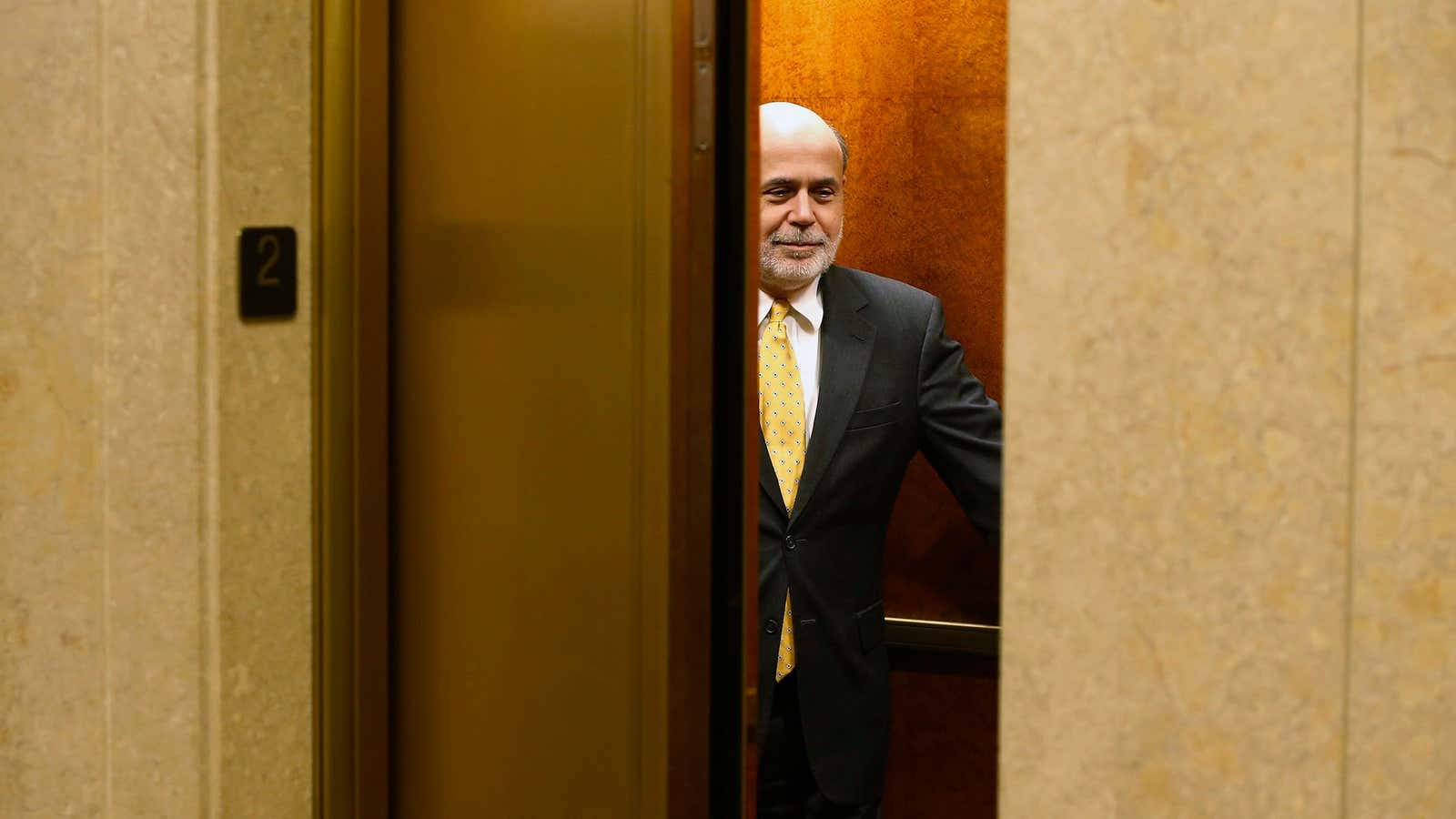First things first: Ben Bernanke’s decision to start advising the giant hedge fund Citadel in no way tarnishes his historic and heroic stint of public service at the helm of the US Federal Reserve. A monetary economist with a particular passion for the Great Depression, Bernanke was the perfect person to lead the US central bank through the worst financial crisis since the 1930s.
His guidance was all the more crucial given the US political climate. Thanks to rabid partisanship, the government proper (as opposed to the Fed, which is an independent arm of the federal government) wasn’t able to boost spending enough to stimulate the economy. That left the Fed as the sole active recession-fighter throughout much of the Great Recession and the long, slow recovery that followed. In fact, it’s the Fed—rather than the Obama administration or the US congress—that really can take the credit for the fact that the US economy is a bright spot in the global economy right now.
Nor is Bernanke’s decision to work with a financial firm unprecedented. In fact, forget solar and hydroelectric power—engineers should harness the energy generated by the revolving door between Washington and Wall Street. Former US Treasury secretary Tim Geithner is now ensconced as president of private-equity company Warburg Pincus.Ex-Fed governor Jeremy Stein joined BlueMountain Capital, a hedge fund, earlier this year. Former SEC chair Mary Schapiro is now an executive at influential consultancy Promontory Group. US president Barack Obama’s former head of the Office of Management and Budget works at Citigroup’s investment bank. And Obama’s former chief of staff William M. Daley now works for a Swiss hedge fund. The list goes on.
The reason? The pay, of course.
In a chat with the New York Times, Bernanke declined to say what he’ll make for his work at Citadel. But he stressed that he had been approached by banks before and had declined their offers. He said he ruled out working for any bank that’s regulated by the Federal Reserve, and opted for Citadel because it isn’t. ”I wanted to avoid the appearance of a conflict of interest,” he told the Times.
Unfortunately, that’s an impossible goal. By taking a lucrative Wall Street gig, Bernanke can’t help but reinforce the paranoid positions of the world’s Zero Hedge readers, who argue that the Federal Reserve is really just an elaborate conspiracy aimed at enriching a financial plutocracy.
Moreover, the fact that Citadel isn’t regulated by the Federal Reserve doesn’t mean that it shouldn’t be. The $25 billion hedge fund is a high-frequency trader, the kind of entity that’s playing an increasingly important role in the functioning and stability of our most important financial markets. Just a couple days ago an executive at the Federal Reserve Bank of New York gave a speech noting that the rise of electronic and automated trading strategies has introduced new risks into the market for US government bonds, one of the largest and influential markets in the world. He pointed to last year’s so-called US Treasury flash crash as an example of the impact. What if a particularly disorderly bout of trading in the market for US government bonds fuels calls for more regulation of the type of firm that Bernanke is now joining?
In such a debate, Bernanke’s opinion would and should be discounted in light of his arrangement with Citadel. Indeed, even if questions about regulation don’t center on his exact corner of the financial markets, his opinion will likely hold less sway. (That’s not to say his opinion has been purchased, but it should always be noted that he is now being paid to advise a private-sector firm.) That’s definitely a change for a man whose voice and thoughts on the markets have been incredibly influential in recent years. But when academics and policy makers move to Wall Street, that’s—rightly—the cost they pay.
